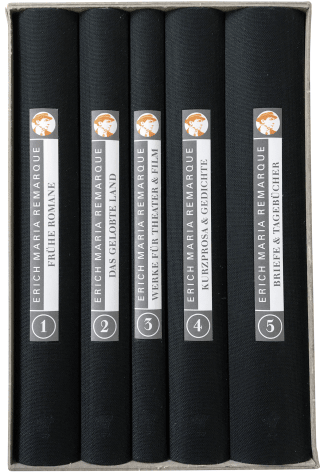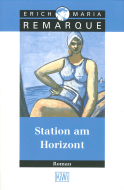
The Unknown Works
Contains five volumes: early novels, his last unfinished novel, works for theatre and film, short prose and poems, letters and diaries
Volume 1: Early novels
Die Traumbude (The Dream Garrett, 1920)
Remarque’s first novel is influenced by the memory of the young author’s fatherly Osnabrück mentor, Friedrich Hörstemeier. “Uncle Fritz,” as he is called in the novel, has gathered a circle of young disciples around him and tries to impart to them the value of art, literature and philosophy. One of these young men, Ernst Winter, Remarque’s alter ego, is torn between rootedness and solidity on the one hand and the desire to create art and to enjoy life excessively on the other. Ernst falls in love with an actress and leaves for the city of Dresden. Only Fritz' death summons him back to his hometown and allows him to glimpse the possibility of connecting art and life. This debut novel already deals with certain of Remarque’s basic themes: The confrontation with death and the value of art and philosophy as fundamental, indispensable elements of life.
Rights sold to:
Albania: Fan Noli / Armenia: Edit Publishing / Czech Republic: Euromedia / Bulgaria: Ciela Norma AD / Georgia: Palitra / Russia: AST and ST / Ukraine: Hemiro
Translations into the Chinese, Hungarian, Korean, Latvian, Polish, Romanian and Slovakian language have been published, but rights have already reverted.
Gam (written 1923, published 1998)
Remarque’s second novel was written around 1923-24 and was published only posthumously. Gam is the female protagonist of this coming-of-age story that takes place in numerous exotic settings. In the confrontation with various men and the various world-views and attitudes toward life that they represent, Gam realizes after a global odyssey that the value of human existence can be found in harmony with one’s own individual personality and in a life in tune with nature. This novel, which is strongly influenced by life philosophy, attains special significance as testimony to the aesthetic and philosophical positions Remarque held in the mid-1920s, which run through his oeuvre.
Rights sold to:
Albania: Fan Noli / Bulgaria: Ciela Norma AD / Czech Republic: Euromedia / Russia: AST and ST / Ukraine: Hemiro
Translations into the Chinese, Korean, Latvian, Polish, Romanian and Slovakian language have been published, but rights have already reverted.
Station am Horizont (Station at the Horizon, 1927)
The race car driver Kai is torn between three women: the down-to-earth, rooted Barbara; her foil, the elegant, independent and self-confident Lillian; and the rational, levelheaded Maud Philby, whom Kai will ultimately choose. Remarque’s third novel was first serialized in 1927-28 and did not appear as a book until 1998. It is distinguished by the gripping depictions of car racing and the way the young Remarque grapples with
the basic values of human existence between decadence and rationality.
Rights sold to:
Albania: Fan Noli / Czech Republic: Euromedia / Georgia: Palitra / Italy: Neri Pozza / Russia: AST / Ukraine: Hemiro
Translations into the Bulgarian, Chinese, Croatian, Hungarian, Korean, Latvian, Polish, Romanian, Slovenian and Slovakian language have been published, but rights have already reverted.
Volume 2: Das gelobte Land (The Promised Land)
Remarque worked for several decades on this final installment in his story of emigration, exile in the United States during the Second World War and the question of return to Germany in the wake of the war. He died before he could finish the novel. The world wanted a “last great Remarque.” Thus Shadows in Paradise was published in 1971, a version of the novel taken from his posthumous papers and heavily edited by the publisher. In 1998 the state of the text at the time of Remarqueʼs death in 1970 was reconstructed from his papers and published as an unfinished novel under Remarque’s title The Promised Land. The two versions differ substantially. The basic plots of the two versions are identical: the German emigrant Robert Ross (Ludwig Sommer in The Promised Land) has made it from Europe to the United States and tries to build a life for himself in New York. Remarque depicts a panopticon of exile fates, closely based on the real life stories of German emigrants, some of them well known. He asks how the period following exile might look: Is return possible or is integration in American society necessary? What sacrifices must be made? How can the differences between European and American culture be reconciled? What does assimilation mean for the individual? And finally: Are the criminals to go unpunished, and is forgiveness possible? This last question receives a largely positive answer in the early version Shadows in Paradise. In the surviving notes on the ending of The Promised Land, return is possible only in conjunction with revenge, which raises moral questions. This novel-in-progress poses timeless questions about integration and assimilation, which remain highly relevant around the world today.
Rights sold to:
Albania: Fan Noli / Bulgaria: Era Publishers / China: Horizon Media / Estonia: Sinisukk / France: Editions Stock / Georgia: Palitra / Great Britain: Vintage / Italy: Neri Pozza Editore / Russia: AST
Translations into the Bulgarian, Croatian, Czech, Latvian, Lithuanian, Hungarian, Korean, Polish, Romanian, Slovenian and Slovakian language have also been published, but rights have already reverted.
Volume 3: Works for Theatre and Film
Der letzte Akt (The Last Act, 1955)
A screenplay, written in 1954, based on Michael A. Musmanno‘s documentary In zehn Tagen kommt der Tod. Augenzeugen berichten über das Ende Hitlers (Death is coming in ten days. Eye witnesses report about Hitler’s end) from 1950. Musmanno had been a judge at the Nuremberg Trials and with his report he wanted to counter the myth that Hitler might still be alive.
This text is based on Remarque’s second draft which was later heavily reworked, much to Remarque’s chagrin. In the film credits it says: “After an unpublished draft by Erich Maria Remarque. Screenplay: Fritz Habeck.” Despite the difficulties during the writing process and in the cooperation with the film company, Remarque always identified with the content and the intentions of the film. The work on Der letzte Akt fell into a time in which he – both personally and professionally –tried to come to terms with Germany’s recent history and the way Germany dealt with it after the war. For Remarque the work on this screenplay was an important part of his political and literary work in the first half of the 1950s.
The premiere of the film, directed by Georg Wilhelm Pabst, was in 1955 and it was released in 52 countries which was up to then the biggest success of a German film after the war.
Rights sold to:
Russia: AST
Die letzte Station (Full Circle, 1956)
Like other writings from the first half of the 1950s, Die letzte Station shows strong allusions to the contemporary mindset. The play was not only meant to be an all but historical report on the situation of Berlin after it was conquered by the Red Army in spring 1945, but many aspects are designed to be a symbolic allusion to the situation of Germany in the 1950s. In the play, the attempt by SS member Schmidt to change identity by getting hold of the papers of a concentration camp prisoner, are linked to the widespread re-evaluation of the question of guilt – if not even the whitewashing of perpetrators – in real-life West Germany. At the same time the presentation of Red Army soldiers on stage opens the discussion whether Germany had “lost” the war or had been “freed”. Although he also mentions the atrocities committed by the Red Army which in the awareness of Germans were linked to their arrival, in the middle of the Cold War Remarque manages to draw a differentiated picture of the liberators-turned-enemies-again.
The world premiere was in June 1956 in Berlin at the Renaissance-Theatre. The play did not have a long life in German speaking territories but became a big success in Eastern Europe and Russia with translations into Russian, Polish and Slovak. Heavily revised and reworked versions have been staged later without much succes. This text follows the authorized version of the world premiere.
Rights sold to:
Russia: AST
Volume 4: Short Prose and Poems
Rights sold to:
Russia: AST
Translations into the Bulgarian and Polish language have also been published, but rights have already reverted.
Volume 5: Letters and Diaries
Rights sold to:
Russia: AST
Albania, Bulgaria, China, Croatia, Czech Republic, France, Great Britain, Hungary, Italy, Korea, Latvia, Lithuania, Poland, Romania, Russia, Slovakia, Slovenia, Taiwan, Turkey, Uzbekistan
- Publisher: Kiepenheuer&Witsch
- Release: 01.04.1998
- ISBN: 978-3-462-02695-5
- 2608 Pages
- Author: E.M. Remarque
- Edited by: Thomas F. Schneider Tilmann Westphalen


